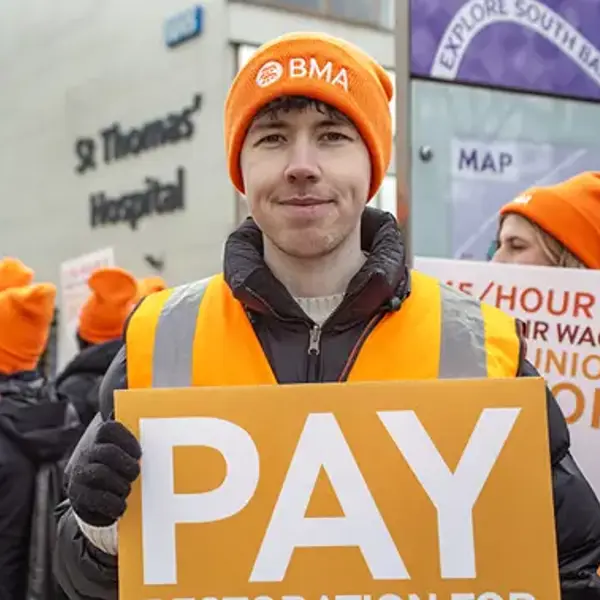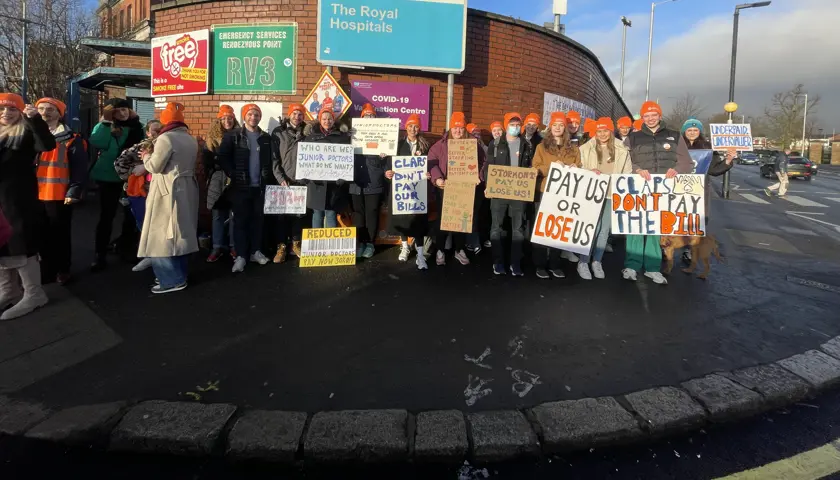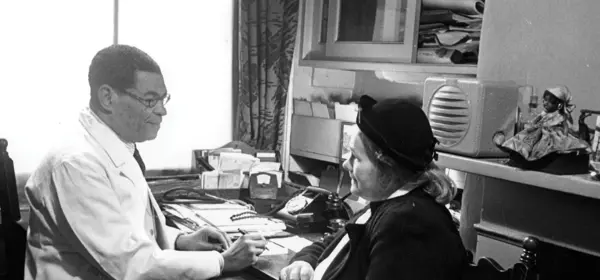Continuing resolve
Continuing resolve
Years of real-term pay decline and an unsustainable workload mean junior doctors in England, Wales and Northern Ireland are determined to carry on with industrial action.
Junior doctors in England, Wales and Northern Ireland have stressed their continuing determination to strike for fair pay.
In England, there was a 133-hour walkout last month, which was the 10th round of industrial action.
South Thames BMA regional junior doctors committee chair Daniel Zahedi says: ‘We believe our demands are valid, we’ve had two historic ballots, we’re in the process of getting a third, and I’m confident we’re going to get it. It shows there is this level of discontent amongst doctors, but also that we are still united, we still have this strength of resolve to get this dispute done.’
The latest strike action in England came after the Department of Health and Social Care failed to meet an 8 February deadline of presenting a revised offer on pay to the BMA.
While the BMA junior doctors committee offered to suspend the strikes in exchange for a four-week extension of the mandate for industrial action by health secretary Victoria Atkins, the absence of such a commitment left thousands of doctors in England with no alternative.
As well as attending the picket at St Thomas’, one of three super picket lines in England along with those in Manchester and Birmingham, foundation year 2 Callum Parr was one of many junior doctors who used the period of industrial action to donate blood for the first time.
‘I know many colleagues who’ve gone and done it for the very first time and each time you donate blood it can save up to three lives so it’s a great initiative.’
BMA junior doctors committee deputy co-chair Sumi Manirajan says the continued support of patients was something she and her colleagues valued deeply, and did not take for granted.
‘We want the public to be with us on this because we’re doing this ultimately so they get better care, and we get better doctors in the NHS,’ she says.
Patient backing
Junior doctors on a 72-hour strike in Wales last month spoke of a profound sense of hurt and frustration that the pay offer made to them by their government was lower than in any other part of the UK.
Speaking at a demonstration outside University Hospital of Wales in Cardiff, foundation year 1 Imogen Potter said: ‘The Welsh nation is already more poorly funded than other nations, and the incentive to stay is now less.’
Specialty trainee 2 Rachel Kerr was concerned that retention across all sectors of the health service would not improve until pay rose. She said junior doctors deserved pay restoration to 2008 levels not least because of the considerable responsibilities they shouldered and the emotional toll of the work.
‘We’ve got an ever-increasing workload, we’ve got an ageing population, and there’s just less and less of us,’ said Dr Kerr. ‘When you’re on call on a weekend or overnight, and there’s just you and you’re covering multiple wards, it’s a lot. We have people’s lives in our hands.’
Chronic understaffing means we’re not able to deliver the care we want to
Dr Babs-Osibodu
BMA Welsh junior doctors committee co-chair Oba Babs-Osibodu says junior doctors in Wales had ‘absolutely no choice’ but to strike until a ‘credible’ new pay offer is made.
‘I’d much rather be in work,’ says Dr Babs-Osibodu. ‘But that feeling is dwarfed by the gargantuan pay cuts that we’ve received and the ridiculous levels of burnout that we’re seeing. And I’ve seen the impact that this is having on patients; chronic understaffing means we’re not able to deliver the care we want to.’
Recruitment crisis
In Northern Ireland, doctors staged their first strike of the campaign as they walked out for 24 hours earlier this month.
BMA junior doctors committee chair Fiona Griffin says: ‘We had to get the ball rolling. At some stage someone had to listen to us. We couldn’t leave it until our pay had eroded by 50 per cent.’
Junior doctors in Northern Ireland have been told that the devolved government is unable to act until an agreement is reached in England – even though health is a devolved issue.
Marcus Hollyer, an internal medicine trainee 2 demonstrating with colleagues outside Belfast’s Royal Victoria Hospital, cast doubt on the logic of the devolved government’s position.
He says: ‘Scotland were able to negotiate an offer that their members accepted. They didn’t go on strike. That represents an effective relationship with their devolved government.’
He says doctors are being drawn to better-paid roles in the Republic of Ireland.
‘A lot of people live here and work over the border,’ he says. ‘They also have challenges with their working conditions, but they are significantly better remunerated for that work.’
In Northern Ireland, GMC survey results found 49 per cent of trainees reported working above their rostered hours – higher than the UK average of 42 per cent – and a higher proportion (38 per cent) reported rota gaps than in the UK (28 per cent).
Foundation year 1 Ross Brown said: ‘It’s hard enough to recruit to Northern Ireland anyway, and the low pay makes it even worse.
‘Rota gaps have become permanent gaps. There’s a permanent staffing shortage, it’s the new normal. If someone else is off sick, you are left doing the work of two doctors. It’s not sustainable, and more and more people are leaving. We don’t feel like we’re giving the care we want to give.’
- Until September 2024, resident doctors were referred to as ‘junior doctors’ by the BMA. Articles written prior to this date reflect the terminology then in use






